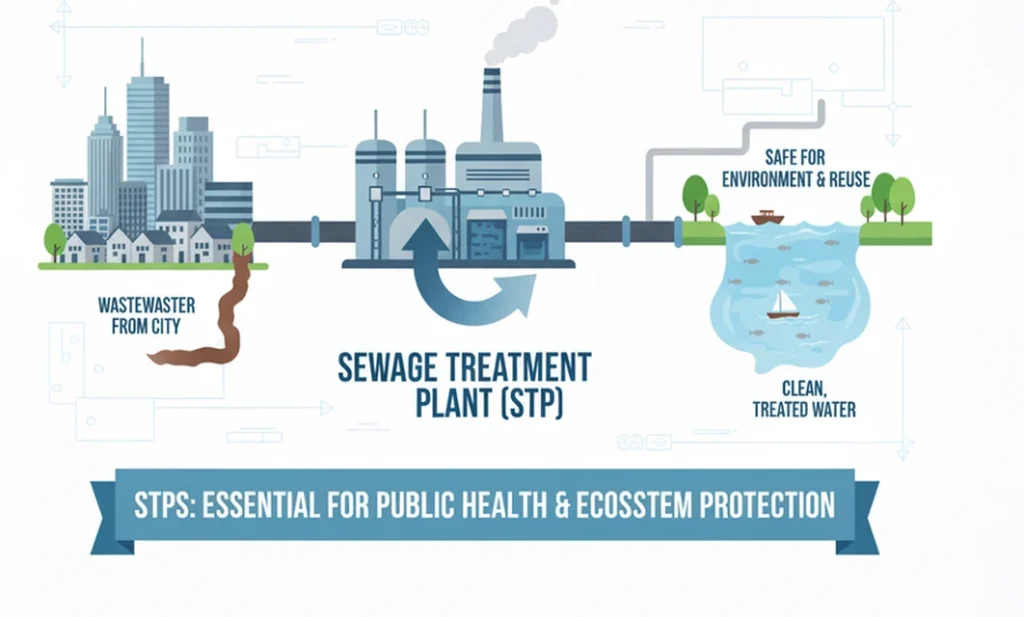
The Importance of STPs in Modern Urban Infrastructure
Urbanization is advancing at an unprecedented pace, and with it comes the challenge of managing wastewater effectively. As cities grow, the demand for clean water, safe sanitation, and environmental sustainability becomes critical. One of the most vital solutions to these challenges is the development and efficient operation of STPs (Sewage Treatment Plants).
STPs are designed to treat wastewater generated by households, commercial establishments, and industries, ensuring that the water released back into the environment meets strict safety standards. Beyond environmental protection, these plants play a crucial role in public health, water reuse, and sustainable urban growth.
Environmental Protection through STPs
Water pollution is one of the most pressing environmental concerns in urban areas. Untreated sewage can contaminate rivers, lakes, and groundwater, causing irreversible ecological damage. STPs mitigate this risk by removing harmful pathogens, chemicals, and solids from wastewater. By ensuring cleaner water discharge, STPs preserve aquatic life, reduce the spread of waterborne diseases, and contribute to a healthier urban ecosystem.
The Central Pollution Control Board (CPCB) has laid down detailed guidelines on sewage treatment to ensure that treated water meets environmental standards. Compliance with these standards is essential to protect natural water bodies and support sustainable development.
Moreover, as cities face increasing water scarcity, treating and reusing wastewater becomes a critical strategy. STPs allow for water recycling in industrial processes, landscaping, and even for municipal purposes like flushing and cleaning. This not only reduces the strain on freshwater sources but also supports sustainable water management practices.
Public Health Benefits
One of the most immediate and tangible impacts of STPs is on public health. Untreated sewage is a breeding ground for bacteria, viruses, and other harmful microorganisms. Without proper treatment, these pathogens can spread through contaminated water, leading to diseases such as cholera, dysentery, and hepatitis.
By efficiently treating wastewater, STPs minimize the risk of disease outbreaks, especially in densely populated urban centers. Access to treated water enhances hygiene and quality of life, making cities safer and more livable for residents.
STPs and Sustainable Urban Growth
Modern cities are built on the foundation of sustainable infrastructure, and STPs are an integral part of this framework. By ensuring that wastewater is treated efficiently, cities can expand responsibly without compromising the environment. STPs support urban planning by enabling new residential and commercial projects while maintaining ecological balance.
The Ministry of Housing and Urban Affairs (MoHUA) has emphasized wastewater management as a key pillar of its urban development and sanitation programs. By aligning with these national policies, infrastructure providers can help accelerate India’s transition toward sustainable and smart cities.
In addition, integrating STPs with other infrastructure projects—such as water supply networks, rainwater harvesting, and smart grids—creates a comprehensive ecosystem for urban sustainability. This interconnected approach ensures efficient resource utilization and positions cities to meet the environmental challenges of the future.
VVIP Infratech’s Contribution to STP Development
VVIP Infratech has been a pioneer in providing advanced STP solutions that cater to the diverse needs of urban centers. Their expertise encompasses design, installation, operation, and maintenance of sewage treatment plants, ensuring optimal performance and long-term reliability.
By employing state-of-the-art technologies, VVIP ensures that wastewater treatment is not only effective but also energy-efficient and environmentally friendly. From municipal projects to industrial applications, their solutions help cities achieve sustainability targets while maintaining operational efficiency.
The Role of STPs in Smart Cities
The concept of smart cities emphasizes data-driven decision-making, automation, and sustainable urban planning. In this context, STPs are becoming smarter with the integration of IoT sensors, real-time monitoring systems, and AI-driven management tools. These innovations optimize treatment processes, reduce energy consumption, and provide actionable insights for maintenance and operational planning.
By incorporating smart technologies, STPs can transform from simple wastewater treatment units into integral components of urban resource management, contributing to water conservation, energy efficiency, and environmental protection.
Looking Ahead
The future of urban infrastructure depends heavily on sustainable wastewater management. STPs are not just facilities for cleaning water—they are cornerstones of urban health, sustainability, and resilience. Investing in advanced sewage treatment infrastructure today ensures that cities remain clean, safe, and environmentally responsible for future generations.
For cities aiming to balance growth with ecological responsibility, STPs represent a non-negotiable investment. With the expertise of companies like VVIP Infratech, urban centers can embrace sustainable development while providing residents with a high quality of life.
In conclusion, as urban areas continue to expand, STPs will remain critical in shaping the cities of tomorrow. By protecting the environment, safeguarding public health, and enabling sustainable growth, sewage treatment plants are the unsung heroes of modern urban infrastructure.

Fifth Floor Chamber No. 1 : VVIP Style Raj Nagar Extension, Ghaziabad, Uttar Pradesh - 201017
Quick Links
Copyright: 2025 VVIP Group. All Rights Reserved.
Designed by Oreganobrandworks.
